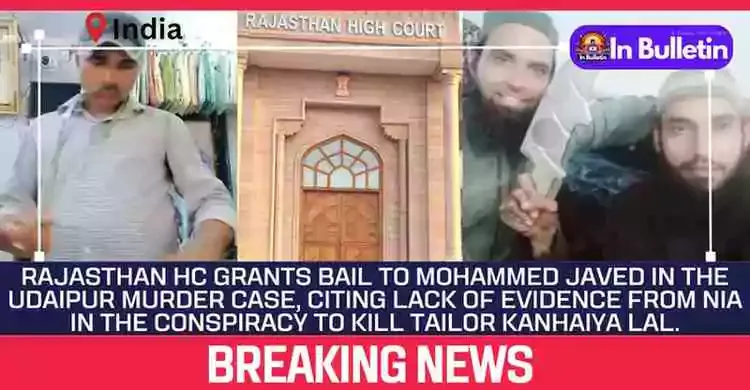Jaipur: The Rajasthan High Court granted bail to Mohammed Javed, one of the accused in the brutal murder of Udaipur tailor Kanhaiya Lal. Javed, who was arrested by the National Investigation Agency (NIA) in July 2022, nearly a month after the murder, was released on a personal bond of ₹2 lakh and an additional surety of ₹1 lakh.
Background of the Case
Kanhaiya Lal, a tailor in Udaipur, was killed on June 28, 2022, by Riyaz Attari and Ghous Mohammed, two radicalized individuals who posed as customers to enter his shop. The attack, which was captured on video and widely circulated on social media, led to national outrage. The perpetrators claimed responsibility for the murder, stating they acted in retaliation to Kanhaiya Lal’s support for Nupur Sharma, a former Bharatiya Janata Party (BJP) spokesperson who made controversial remarks about Prophet Mohammed during a TV debate. The murder took place just days after the inflammatory statements, which had triggered protests and clashes across India.
Role of Mohammed Javed and the NIA’s Allegations
The NIA, which took over the investigation from the state police, accused Mohammed Javed of playing a key role in the conspiracy to murder Kanhaiya Lal. According to the NIA, Javed conducted reconnaissance and informed the main accused, Riyaz Attari, of Kanhaiya Lal’s presence at his shop. The agency also claimed that Javed was involved in planning the attack with Attari and Ghous Mohammed the night before the murder. Javed was arrested on July 22, 2022, following these accusations.
The NIA further alleged that the accused, including Javed, were self-radicalized and that Attari had connections with Dawat-e-Islami, a Karachi-based organization. On February 13, 2024, the NIA filed a charge sheet against all the accused in a special court, including charges under the Unlawful Activities (Prevention) Act (UAPA) and various sections of the Indian Penal Code (IPC) related to murder, criminal conspiracy, and promoting enmity between different groups on religious grounds.
Court’s Observations and Bail Decision
However, during the bail hearing, Javed’s lawyer, Saadat Ali, argued that the NIA had failed to provide concrete evidence linking his client to the crime. Ali highlighted that Javed’s name was not mentioned in the primary FIR and that he was not present in any CCTV footage from Kanhaiya Lal’s shop on the day of the murder. Furthermore, the NIA could not substantiate the claim that Javed met with the main accused at a tea shop to plan the murder; the tea shop owner also denied Javed's presence.
The division bench of Justice Pankaj Bhandari and Justice Praveen Bhatnagar noted that the only evidence presented by the NIA against Javed was his call records, which did not prove his involvement in the conspiracy. The court also observed that no suspicious items were recovered from Javed's residence, and his last known location was traced near Kanhaiya Lal's shop five hours before the murder occurred. Based on these findings, the court granted bail to Javed, stating that there was insufficient evidence to continue his detention.
Ongoing Investigation and Future Proceedings
While Mohammed Javed has been granted bail, the investigation into the case continues. The two main accused, Riyaz Attari and Ghous Mohammed, remain in custody, and the NIA has charged them under various provisions of the UAPA and the IPC. Another accused, Farhad Mohammed, was also granted bail earlier, while two other suspects, Salman and Abu Ibrahim, are still absconding.
The special NIA court has framed charges against the accused, including under IPC sections 302 (murder), 452 (trespassing), 153A (promoting enmity between different groups on grounds of religion), 295A (acts intended to outrage religious feelings), 120B (criminal conspiracy), and the UAPA. The legal proceedings are expected to continue, as the court examines the evidence against the accused.
Read more:- Tragedy Strikes Georgia High School: 14-Year-Old Charged with Murder After Deadly Shooting.
The bail granted to Mohammed Javed marks a significant turn in the high-profile Udaipur murder case, which has drawn widespread attention due to its communal and political implications. As the legal battle continues, the court's decision underscores the importance of concrete evidence in cases involving severe charges like murder and terrorism. The case remains under close scrutiny, with the NIA and other agencies working to piece together the complete picture of the events leading to the tragic death of Kanhaiya Lal.
Stay tuned with "In Bulletin", for more futher detailed updates on this Incident & World News.




